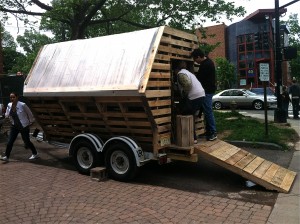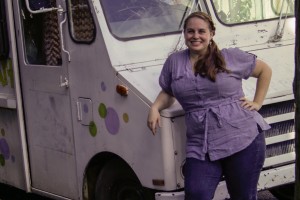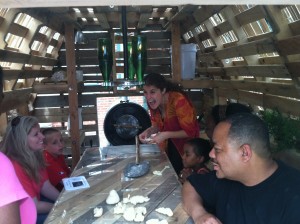Mobile history: Bread and community
23 October 2013 – Richard Anderson

Passersby in downtown Princeton, New Jersey, stop to inspect the Mobile Bread House on a Saturday afternoon in May. Photo credit: Richard Anderson.
This summer I prepared to facilitate a series of introductory public history workshops for fellow students in my graduate history program at Princeton. In thinking about how to present a range of formats and venues for public history, I planned to highlight alternatives to the usual, institution-hosted projects–an important message on a hidebound campus such as mine. This effort led me to survey various examples of mobile history endeavors, with the hope of illuminating the underlying goals and organizational processes behind them.
My investigation began not with a public historian but with an anthropologist who created a traveling bread-making house as a vehicle (no pun intended) for community building. Nadezhda Savova is a newly minted PhD from Princeton whose dissertation examined how community arts centers stimulate reconciliation and social change. She argues that “real change is ultimately always bottom up” and put her ideas into action by founding the non-profit International Council for Cultural Centers (IC3). The organization offers support and training to community arts centers in twelve countries. IC3’s main program, the Bread Houses Network, combines storytelling and collective bread making as a way to engage people who lack the skill or confidence to participate in arts initiatives. As participants mix ingredients and knead dough, a facilitator leads the group in a communal storytelling exercise. Nadezhda frames bread making as a series of metaphors for human relationships: water, salt, sugar, flour, and yeast bind together just like participants bond over their life stories and their work. Before departing Princeton in June to direct IC3’s programs in her native Bulgaria, Nadezhda debuted the Mobile Bread House, a simple wooden trailer equipped with benches, a large table, and a wood-fired oven. I watched her lead participants through the bread-making process in communities as diverse as affluent Princeton and its economically challenged neighbor Trenton.

Erin Bernard, Temple graduate student, with her Philadelphia Public History Truck. Photo credit: Mark Krendel.
The Mobile Bread House is not explicitly or even primarily a history-based endeavor. Yet the storytelling component allows people to organically connect over both their individual and shared pasts. A similar project rooted in a historical perspective–and operating out of a former postal vehicle–is the Philadelphia Public History Truck. Founded by Erin Bernard, a public history graduate student at Temple University, the History Truck demonstrates the potential for pop-up museums to enhance community engagement. Erin plans to move the truck to different neighborhoods in Philadelphia, interpreting local history and wrestling with contemporary issues in partnership with local organizations like the East Kensington Neighbors Association. Her goal is to “shift the power of the museum process from an institution to the community” in order to make public history “accessible literally and figuratively.”
To that end, Erin developed a concept she calls “community curating.” The process involves a series of neighborhood meetings and “Storytelling Block Parties” to identify historical and contemporary themes, followed by the collection of objects and oral histories, supplemental archival research by Erin and other trained historians, and finally exhibit design. The end result will be a temporary exhibit in a public space that can then travel to other neighborhoods. Erin stresses that the History Truck demands “an authentic building of trust between a community and a curator.” She established herself in Kensington partly by volunteering at a soup kitchen in the neighborhood.

Nadezhda Savova, founder of the Mobile Bread House, guides participants through a bread making exercise during an art fair in Trenton, New Jersey, last June. Photo credit: Richard Anderson
The practical, pedagogical, and normative advantages of mobile history projects are closely related. At a pragmatic level, traveling exhibits promise to reach audiences that lack the financial and logistical resources to visit traditional brick-and-mortar museums, while also offering immersive, participatory experiences. They also place ordinary people in the driver’s seat of public history, empowering citizens to curate their pasts and articulate their communities’ present needs and challenges. Hopefully, the tools they gain remain in their possession long after the exhibits come down. Finally, mobile history projects encourage professional public historians to redefine the values of our discipline by asking exactly who we are producing history for.
But these projects also offer distinct challenges. I’ll focus on one. Mobile exhibits seem to thrive with supremely dedicated, dynamic individual practitioners like Erin Bernard and Nadezhda Savova. How can public historians institutionalize mobile projects so that they outlast their originators? The Mobile Bread House and Philadelphia Public History Truck have created mobile programs that are inextricably linked to their core missions, making it unlikely that the traveling component will fall away.
I’ll take what I’ve learned back to my workshops at Princeton, but I’d like to hear from others as well. These are just two examples. What are your favorite mobile history projects? What do you see as the main challenges and opportunities?
~ Richard Anderson is a doctoral student in 20th-century American history at Princeton University.




Why mobility? There seems to be no shortage of empty spaces and poorly designed spaces needing overhaul in communities across America suffering effects of Great Recession and poor community planning. Bonus: not adding to dependency on limited and nonrenewable resource.